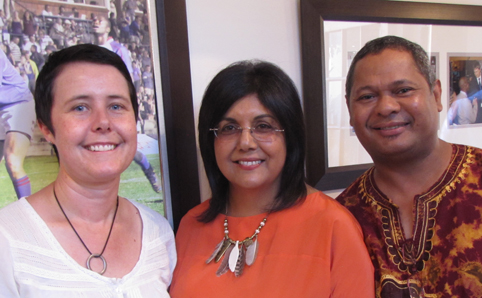Latest News Archive
Please select Category, Year, and then Month to display items
12 October 2020
|
Story Dr Cindé Greyling
|
Photo Supplied
 Exercise and nutrition can work wonders for your mental health – you don’t even have to ‘feel like’ or ‘enjoy’ moving around and eating well for it to work – it does its thing anyway.
Exercise and nutrition can work wonders for your mental health – you don’t even have to ‘feel like’ or ‘enjoy’ moving around and eating well for it to work – it does its thing anyway.
Nowadays, people talk about mental health like it is the common cold – which is good! But do you know what it really means? Being mentally healthy does not only refer to the absence of a mental illness but includes your emotional and social well-being. One would almost want to add physical well-being too, since a healthy body does indeed support a healthy mind. However, since so many people consider themselves ‘mental health experts’, some myths have been sold as truths.
Myth #1 – You are doomed.
Nope. Never. You are never doomed. There is always help. Mental-health therapies range from self-help, talk therapy, medication, to hospitalisation in some cases. Somewhere on this spectrum of treatments, there will be something that works for you. But you must be willing to get the help and do the work. For starters, exercise and nutrition can work wonders – you do not even have to ‘feel like’ or ‘enjoy’ moving around and eating well for it to work – it does its thing anyway.
Myth #2 – It won’t affect you.
It may. Research suggests that one in five people may suffer from a mental illness at some point in their lives. Being well now does not mean that it will stay that way. Biological and environmental factors both impact your mental health. Hopefully not, but at some point, you may experience an event that affects your mental health.
To remain integrated in a community is always beneficial
for anyone suffering from a mental or physical condition.
Myth #3 – Someone struggling with mental health must be left alone.
Hardly! To remain integrated in a community is always beneficial for anyone suffering from a mental or physical condition. You do not need to fix them, but to remain a friend. Continue to invite them, even if they decline. Do not judge, and do not try to understand. Just stay around.
Go and be kind to yourself, and to those around you.
‘We need a story that will excite us all’
2012-03-09
 |
|
Attending the conversation were, from the left: Willemien Marais, Lecturer in the Department of Communication Science; Zubeida Jaffer; and Prof. Andre Keet, Director of the International Institute for Studies in Race, Reconciliation and Social Justice.
Photo: Amanda Tongha
9 March 2012
|
“From the stories of Afrikaner Nationalism and Black Consciousness to the stories of our Constitution and the 1995 Rugby World Cup… But now what do we have?”
This was the question posed by Zubeida Jaffer, recently appointed as the university's Writer-in-Residence. Do we need a new national narrative? was the issue addressed by Ms Jaffer in a talk presented as part of the Critical Conversations series hosted by the university’s International Institute for Studies in Race, Reconciliation and Social Justice. Ms Jaffer is an award-winning journalist and author of, amongst others, Love in a time of treason and Our Generation.
“We can’t change the past and we can’t keep on focusing on separate narratives; we need to find a story, a new national narrative with elements that could excite all of us,” she told an audience consisting of academics and students. She also referred to the changes that took place at the university. “I’m fascinated by what is happening here. It’s mind-boggling to see the changes.” Based on the UFS’ drive to find common ground, Ms Jaffer told the audience that research at universities could and should direct this search for a common South African story.
In reference to her own experiences as a community activist and journalist during apartheid, she urged students to become active citizens. “In my time students were the leaders; they gave direction to the national debate.”
Article (pdf format)